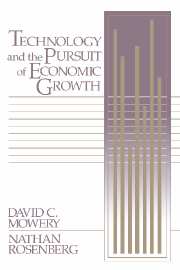Book contents
- Frontmatter
- Contents
- Preface
- Part I Introduction
- Part II The development of the institutional structure, 1860–1940
- 2 The growing role of science in the innovation process
- 3 The beginnings of the commercial exploitation of science by U.S. industry
- 4 The U.S. research system before 1945
- 5 The organization of industrial research in Great Britain, 1900–1950
- Part III The development of the postwar system, 1940–1987
- Part IV New environment, new research organizations
- Bibliography
- Index
2 - The growing role of science in the innovation process
Published online by Cambridge University Press: 22 March 2010
- Frontmatter
- Contents
- Preface
- Part I Introduction
- Part II The development of the institutional structure, 1860–1940
- 2 The growing role of science in the innovation process
- 3 The beginnings of the commercial exploitation of science by U.S. industry
- 4 The U.S. research system before 1945
- 5 The organization of industrial research in Great Britain, 1900–1950
- Part III The development of the postwar system, 1940–1987
- Part IV New environment, new research organizations
- Bibliography
- Index
Summary
A revolution in science, 1859–74
Simon Kuznets has stated that “the epochal innovation that distinguishes the modern economic epoch is the extended application of science to problems of economic production” (1966, p. 9). Although there is general agreement with the view that the dependence of technological progress on science has increased substantially in the course of industrialization, there is considerable disagreement, or at least considerable difference in emphasis, concerning the extent of that dependence. On the one hand, A. E. Musson and E. Robinson (1969) have argued forcefully that technological progress was already heavily dependent on science in the early stages of the British industrial revolution. Their research has provided a wealth of evidence showing, in the British case, the intimate and multitudinous networks that linked the business community to scientists. Robert Schofield has advanced the claim, based on a careful study of the Lunar Society in Birmingham, that the society was really an eighteenthcentury “industrial research group” (Schofield, 1963, p. 437).
On the other hand, a long and influential tradition in the history of technology stresses the crude, trial-and-error, hit-or-miss nature of technological progress (Gilfillan, 1935, 1970). During the preindustrial period, this interpretation argues, scientific and technological research and advancement were social processes that were almost hermetically sealed off from one another.
- Type
- Chapter
- Information
- Technology and the Pursuit of Economic Growth , pp. 21 - 34Publisher: Cambridge University PressPrint publication year: 1989



